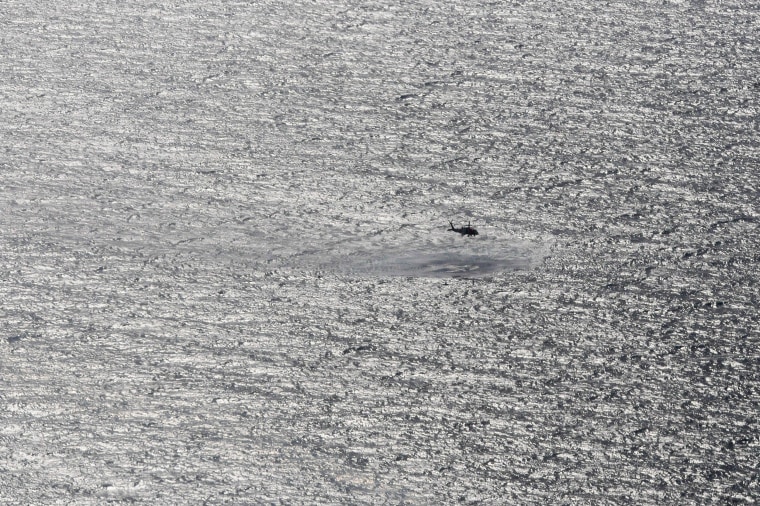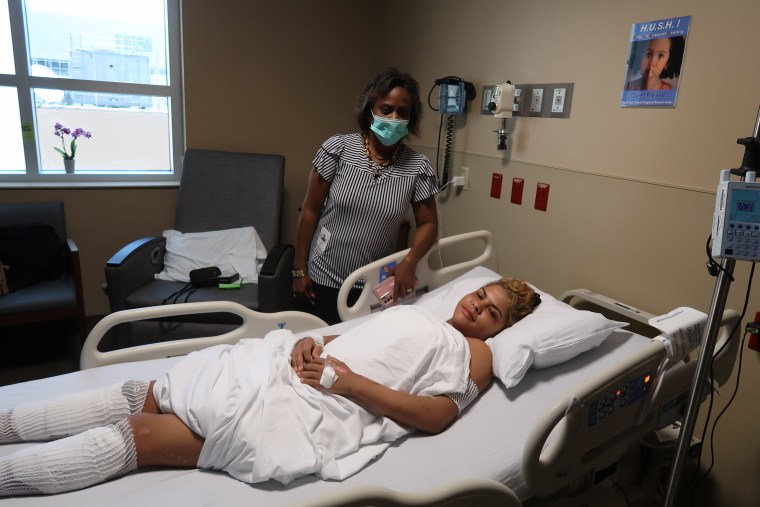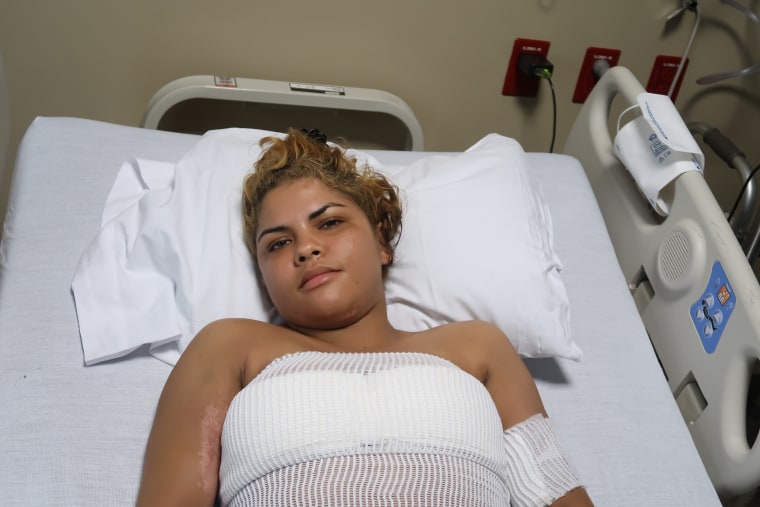MIAMI — When Bárbara Viltres regained consciousness, she was told that she was in Miami, that she had achieved her goal of escaping from Cuba and that she could consider herself lucky.
Unlike some of her fellow travelers, the sea had not swallowed her in the shipwreck off the coast of Florida.
After two weeks in a coma —and against the prognosis of some doctors— the 25-year-old Cuban opened her eyes in a room at HCA Florida Kendall Hospital. But it took her a few seconds to realize that she had paid a high price to reach her destination.
“The wounds I have are very deep. I had holes in my hips. I have had six operations to remove skin from my back and put it on other places,” said Viltres, who survived a three-day journey in the sun, without eating or drinking water, before being rescued by the U.S. Coast Guard off Key West a few weeks ago.
Viltres, who cannot swim, left Havana in early August on a rustic boat bound for Florida, at a time when the economic crisis and reports of political repression in Cuba have reached their highest levels in decades.
Another 14 passengers were part of the illegal trip, including her partner, 21, and her cousin, 38, who arrived safely. Five migrants remain missing and Viltres says she saw several of them drown, including the boat maker and his pregnant wife.
Alicia Perez, who is also Cuban and lives in Miami, volunteered to help Viltres during her recovery. Viltres has no family or friends in the United States.
“She woke up from the coma lost. The first thing she asked the doctor was, 'Where are my nipples?' because so much of her skin had been lost," Perez said about Viltres.
It’s unclear what will happen to the migrants who were rescued, but most of the Cuban rafters intercepted at sea are deported back to Cuba, from where the makeshift boats are setting sail for the U.S. in increasing numbers, according to Coast Guard data.
Cuba is experiencing its largest exodus in recent history, the largest since the 1980s. More than 4,600 Cubans have been intercepted at sea from October to August. On the U.S.-Mexico border from last January to July, border authorities stopped Cuban migrants entering from Mexico nearly 155,000 times, over six times as many as the year before.

In Cuba, medicine and basic foods are scarce and some towns suffer power cuts of up to 20 hours a day due to fuel shortages and an aging power infrastructure, recently damaged by a massive fire.
Viltres is hoping that U.S. authorities grant her mother a humanitarian visa so she can come and help her during her recovery in Miami.
“I don’t have anyone here,” she told Noticias Telemundo. “One always needs the mother next to them.”

Speaking from her hospital bed on Aug. 30, Viltres spoke to Noticias Telemundo about her journey. What follows is a first-person account of her journey, which has been condensed and edited for clarity.
'We were adrift and nobody saw us'
“I paid my ticket of 40,000 pesos (just over $300) without having seen the boat. You couldn’t see it. They were making it in a house in Havana.
I don’t remember when we left, I know it was a Tuesday morning, the first week of August. We put the boat on a cativana (horse-drawn cart) and the men carried it to the sea.
We were 15 people, three women and 12 men. We spent weeks preparing the trip, and we brought crackers and sardines to eat.
I remember that we were all doing well, until half past 10 at night when [the boat] broke down. The waves were strong and water began to enter. We took water but it was a lot. The motor did keep running.
We had a tank of water to drink, but we had to throw it away and use the tank to remove the water that entered from above, below, from wherever — until we decided to turn the boat upside down to get on top and not drown.
We were drifting until dawn and no one saw us, and it got dark and no one saw us, it was dawn again and no one saw us. We had three nights without sleep. We couldn't. If you fall asleep, you sink and drown.”
'The worst'
“[Seeing people drown] was the worst, because we were all together, we all got along.
The mechanic [of the boat] and his three-month-pregnant wife drowned. She saw him drown. My boyfriend asked her where her husband was, and she said: ‘He drowned.' She had no more strength either.
Joseíto, my cousin’s husband, the one who assembled the boat, did not make it either. That's painful. They all had to arrive, but he had to arrive, he was the one who made it, who looked for everything.
My cousin couldn’t help him because she doesn’t know how to swim. I saw him sink and come out again. The night we left he was very tired, because they spent many days preparing the boat, without sleeping.
There weren’t that many left: Inaudy, my cousin, my husband, me, Julio, Osmany.
Since then I don’t know anything else. What they tell me: that a small plane appeared, that someone signaled to it and that one of those Coast Guard speedboats arrived.”
'I didn’t want to be in Cuba anymore'
“When they rescued me, I was unconscious. I hadn’t eaten or drank water since the day we left. They tried to revive me, to get water out of my chest, but what I released was foam.
I arrived badly. My kidneys weren’t working, my lungs stopped. I was rotting from the wounds I had, until the doctors saved me.
When I woke up from the coma, I asked for my husband, because he was falling asleep when we were on the boat. When he fell asleep, I grabbed him by the sweater.
My whole body hurts, but it was worth it. Just as I am, it was worth it. This heals. I never regret what I do. Never.
In Cuba, there is a lot of need, I didn’t want to be there anymore, I didn't want to. People are desperate to leave. The situation in the country is very bad. It's difficult to get anything.
My mother is in Cuba and I would like her to come. I have spoken with her on the phone and she is crying. But I tell her I’m fine, not to worry. She knows I’m in a hospital and she sees my face, but she doesn’t know how I am or everything I have.
The first thing is to recover from all the wounds, which are deep. And then I’ll start working on whatever. The doctors tell me that the recovery is super slow.
I am crazy to go out and see things, I haven't seen anything. I went straight to a hospital. They told me that Miami was like Havana. I imagine it as Havana.”
Reporter Eduardo ‘Yusnaby’ Rodríguez contributed to this story.
An earlier version of this story was first published on Noticias Telemundo.
Follow NBC Latino on Facebook, Twitter and Instagram.
